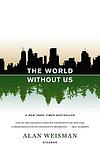The Greatest "Speculative Fiction, Physical Sciences" Books of All Time
Click to learn how this list is calculated.
This list represents a comprehensive and trusted collection of the greatest books. Developed through a specialized algorithm, it brings together 300 'best of' book lists to form a definitive guide to the world's most acclaimed books. For those interested in how these books are chosen, additional details can be found on the rankings page.
Genres
Speculative fiction is an umbrella genre encompassing narrative fiction with supernatural or futuristic elements. This includes genres such as science fiction, fantasy, horror, supernatural fiction, superhero fiction, utopian and dystopian fiction, apocalyptic and post-apocalyptic fiction, and alternate history. The unifying factor of speculative fiction is its departure from the narrative constraints of reality, exploring imaginative and often profound questions that challenge our understanding of the world and our place within it. These stories often delve into themes like the human condition, social commentary, and the exploration of philosophical and ethical dilemmas through the lens of the fantastical or the yet-to-be-possible. By pushing the boundaries of the known, speculative fiction invites readers to consider the myriad possibilities of existence and the potential consequences of our actions in worlds that are, at once, vastly different from and eerily similar to our own.
The "Physical Sciences" category encompasses a broad range of books that delve into the non-living systems of the natural world, offering insights into the fundamental principles and phenomena that govern the universe. This category includes disciplines such as physics, chemistry, astronomy, geology, and meteorology, among others. Books within this genre may cover topics from the subatomic particles and forces that constitute the fabric of space-time to the vast cosmic structures of galaxies and the universe at large. They can also explore the chemical reactions that underpin the behavior of matter, the geological processes that shape our planet, and the atmospheric dynamics that influence our weather and climate. Whether aimed at students, professionals, or enthusiasts, these books serve as a gateway to understanding the laws of nature and the scientific methodologies used to uncover them, often combining theoretical concepts with practical applications and the latest research findings.
Countries
Date Range
Reading Statistics
Click the button below to see how many of these books you've read!
Download
If you're interested in downloading this list as a CSV file for use in a spreadsheet application, you can easily do so by clicking the button below. Please note that to ensure a manageable file size and faster download, the CSV will include details for only the first 500 books.
Download-
1. City by Clifford D. Simak
"City" by Clifford D. Simak is a collection of interconnected short stories that explore the future of humanity and the evolution of civilization. Set in a distant future where humans have abandoned Earth and left it to robots and intelligent dogs, the book delves into themes of loneliness, the nature of humanity, and the possibility of coexistence between different species. Through a series of thought-provoking narratives, Simak paints a vivid picture of a world where technology and nature intertwine, challenging readers to contemplate the essence of what it means to be human.
-
2. The World Without Us by Alan Weisman
This book is a thought-provoking exploration of what would happen to the natural and artificial world if humans suddenly disappeared. It delves into how our massive infrastructure would decay and how, over time, the Earth would heal from human impact, erasing all traces of our civilization. The author uses this premise to illustrate the lasting impact of humanity on the planet, providing a unique perspective on issues like climate change, pollution, and deforestation.
-
3. 2010: Odyssey Two by Arthur C. Clarke
"2010: Odyssey Two" by Arthur C. Clarke is a science fiction novel that follows a joint Soviet-American mission to investigate the mysterious events surrounding the spaceship Discovery One, which disappeared nine years earlier on its mission to Jupiter. As the crew embarks on their journey, they encounter strange occurrences and discover a hidden alien presence on Jupiter's moon, Europa. With tensions rising and the fate of humanity at stake, they must uncover the truth behind the monoliths and face the unimaginable consequences of their discoveries.
Reading Statistics
Click the button below to see how many of these books you've read!
Download
If you're interested in downloading this list as a CSV file for use in a spreadsheet application, you can easily do so by clicking the button below. Please note that to ensure a manageable file size and faster download, the CSV will include details for only the first 500 books.
Download

